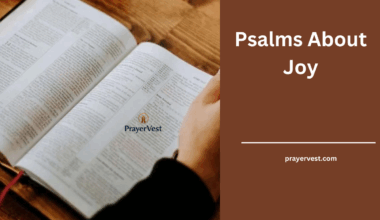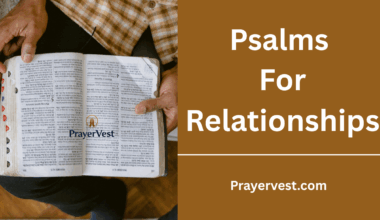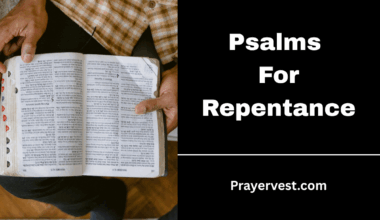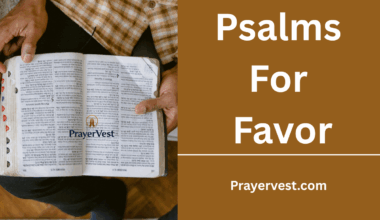Psalms Quoted In The New Testament. From the Old Testament to the core of the New Testament story, the Book of Psalms is a pivotal text. The Psalms, which are quoted more than any other book in the Old Testament, provided Jesus, the apostles, and the early Church with a spiritual language.
As the New Testament makes clear, these holy songs foretold the arrival of the Messiah and encapsulated the depth of Israel’s relationship with God on an emotional, theological, and prophetic level. Psalms were constantly invoked to confirm the identity of Christ and the progress of God’s redemptive plan, whether in times of pain or exaltation.
One of the most profound aspects of the Psalms is their prophetic voice. Many psalms, particularly those of David, foreshadow events in the life, death, and resurrection of Jesus. For instance, Psalm 22’s vivid language—“My God, my God, why have you forsaken me?”—was not only echoed by Christ on the cross but also interpreted by the early Church as a messianic preview of His suffering. Psalms like 110:1, “The Lord says to my Lord: ‘Sit at my right hand…’” became key texts in explaining Jesus’ divine authority and eternal priesthood.
These verses, woven into the teachings of Jesus and the writings of Paul and others, reveal how deeply rooted the gospel is in the poetic and prophetic heart of the Psalter.
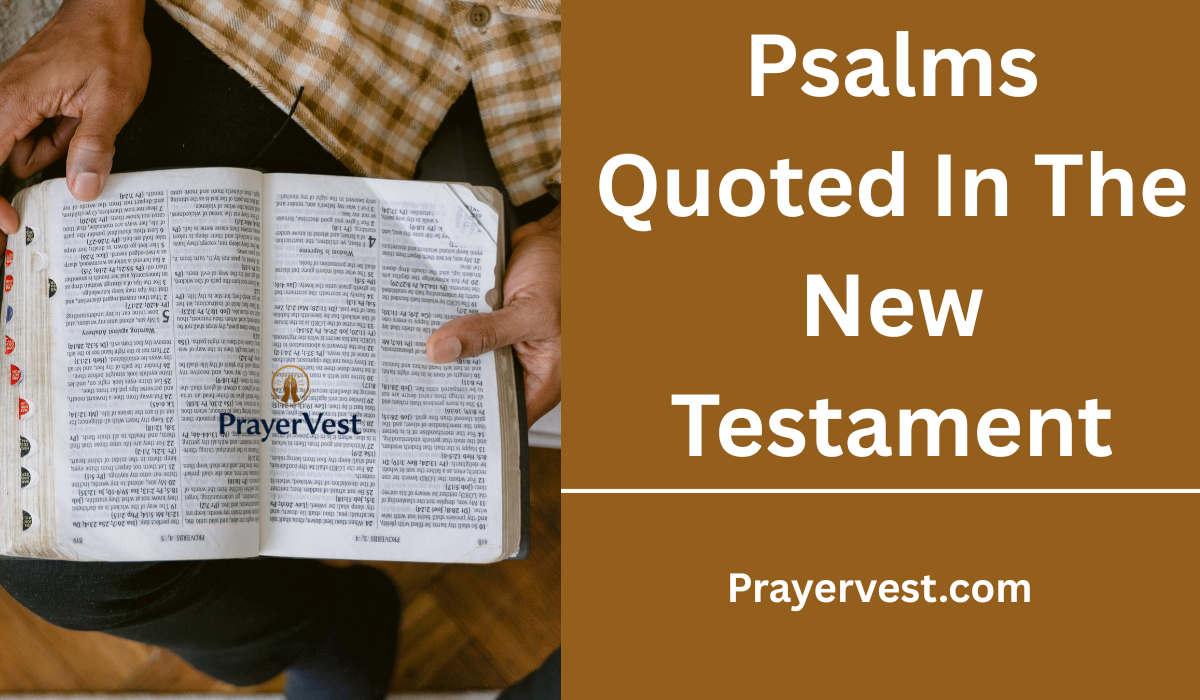

The New Testament Psalms are a source of teaching, consolation, and worship in addition to doctrine and prophecy. Paul encouraged Christians to sing “psalms, hymns, and spiritual songs,” demonstrating how they are still used in the Church’s spiritual life. At the Last Supper, Jesus and His disciples most likely performed a hymn from the Hallel psalms (Psalms 113–118), which are customarily chanted throughout Passover. The Psalms serve as a bridge across covenants, testaments, and hearts from the cross to the synagogue to the epistles, demonstrating their everlasting capacity to convey divine truth into all eras.
50 Powerful Psalms Quoted In The New Testament (2026)
1. Psalm 2:7
“You are my Son; today I have become your Father.”
Quoted in Hebrews 1:5 and Acts 13:33, this verse affirms the divine sonship of Jesus Christ. Originally a royal enthronement psalm, it finds its ultimate fulfillment in Christ, the true King and Son of God. The New Testament writers use it to highlight Jesus’ unique relationship with the Father and to validate His messianic authority and identity. This declaration is not merely symbolic—it speaks to the eternal nature and divine origin of Christ’s kingship.
Reflection
Jesus’ sonship is the foundation of our adoption into God’s family. Because He is the beloved Son, we too are accepted, cherished, and empowered as sons and daughters. In a world of shifting identities and fragile self-worth, this truth grounds us. When you feel lost, unloved, or unworthy, remember: the Father who declared Jesus His Son has also called you His own through Christ. This Psalm reminds us that divine favor is not achieved, but received through a relationship with the Son.
2. Psalm 8:4-6
“What is mankind that you are mindful of them, human beings that you care for them? You made them a little lower than the angels and crowned them with glory and honor.”
Quoted in Hebrews 2:6-8, this Psalm marvels at God’s care for humanity despite our smallness in the cosmos. The writer of Hebrews applies it to Jesus, showing how Christ stooped to take on human flesh, suffered, and was later exalted above all. This Psalm becomes a lens to view both the dignity of humanity and the humility of Christ’s incarnation.
Reflection
This verse invites us to sit in awe, both of our place in God’s creation and of the astonishing fact that Jesus willingly became like us. You are not an accident or an afterthought. God crowns you with honor, not because of your résumé, but because of His divine design. And Christ’s coming shows that God’s mindfulness is not abstract—it’s deeply personal. He doesn’t just think about you; He came for you. Live today with the quiet dignity of someone deeply loved by the Creator.
3. Psalm 16:10
“Because you will not abandon me to the realm of the dead, nor will you let your faithful one see decay.”
Quoted in Acts 2:27 and Acts 13:35, this verse forms a cornerstone of early Christian preaching. While David originally expressed confidence in God’s protection, Peter and Paul reveal its deeper meaning: the resurrection of Jesus. Christ, the Holy One, did not experience bodily decay—God raised Him, proving His victory over death and affirming Him as the Messiah.
Reflection
Our hope as believers is not only in life’s blessings but in the power of resurrection. Death is not the end—it’s a doorway. Just as God did not leave Jesus in the grave, He will not abandon you in your darkest valley. Whatever decay seems to threaten your soul—whether it’s sin, sorrow, or spiritual fatigue—resurrection power is available. Trust the God who breathes life into lifeless places. In Him, even what looks final can be reversed.
3. Psalm 22:1
“My God, my God, why have you forsaken me?”
Quoted directly by Jesus in Matthew 27:46 and Mark 15:34 during His crucifixion, this verse captures the depth of Christ’s suffering and His identification with human despair. Though originally written by David during a period of intense affliction, its prophetic fulfillment is vividly seen in the passion of Christ, reflecting both agony and profound trust in God’s ultimate deliverance.
Reflection
Even Jesus, the Son of God, knew what it felt like to be forsaken. His cry echoes the cries of every soul that’s felt abandoned, betrayed, or overwhelmed by suffering. But his quote was not the end—it was a bridge toward the hope of resurrection. This Psalm reminds us that God welcomes our raw, honest prayers and that even in silence, He is still sovereign. If Christ endured the cross with this Psalm on His lips, we too can bring our pain to God, trusting that resurrection is on the other side of abandonment.
4. Psalm 22:18
“They divide my clothes among them and cast lots for my garment.”
Fulfilled in Matthew 27:35 and John 19:24, this verse describes a specific event at the crucifixion—Roman soldiers casting lots for Jesus’ clothing. Originally a lament by David, this Psalm prophesied the exact details of the Messiah’s suffering, showing God’s foreknowledge and sovereign plan, even over the cruel acts of men.
Reflection
Nothing in Jesus’ suffering was accidental. Even the smallest detail—the stripping of His garments—was part of a divine story foretold long before. This truth anchors our faith: if God could weave prophecy and fulfillment so precisely in the darkest hour, He can also orchestrate redemption in our broken places. Your pain is not pointless. It may be part of a story far greater than you imagine—one where glory follows grief.
5. Psalm 31:5
“Into your hands I commit my spirit; deliver me, Lord, my faithful God.”
Quoted by Jesus in Luke 23:46 as His final words before death, this verse is a declaration of trust amid suffering. David originally penned it in desperation, but Jesus reclaimed it as an offering of His life to the Father. It encapsulates complete surrender, even in the face of death.
Reflection
When fear grips us, when death seems close, and when control slips through our fingers, this Psalm teaches us what surrender sounds like. Jesus didn’t just quote this; He embodied it. He entrusted His spirit to the Father fully. We, too, are invited to let go of our striving and say: “Into Your hands.” True peace comes not from control, but from trust in God’s faithfulness—even in our final breath.
6. Psalm 34:20
“He protects all his bones, not one of them will be broken.”
Referenced in John 19:36, this verse is fulfilled in the crucifixion of Jesus, when the soldiers found He was already dead and did not break His legs. This subtle but powerful prophecy signifies that Jesus is the true Passover Lamb, whose bones were to remain unbroken (Exodus 12:46).
Reflection
God’s care is precise, even in suffering. The unbroken bones of Jesus point to a deeper truth—His body bore all sin, yet remained whole to fulfill righteousness. In our trials, we may feel fractured, but God keeps us spiritually intact. He doesn’t let pain break what He has promised to protect. Trust in His ability to preserve you—even when you’re nailed to life’s crosses.
7. Psalm 40:6-8
“Sacrifice and offering you did not desire—but my ears you have opened… I desire to do your will, my God; your law is within my heart.”
Quoted in Hebrews 10:5-7, this passage shows that God’s true desire isn’t ritual sacrifice, but a willing, obedient heart. Jesus embodies this perfectly, fulfilling God’s will through His incarnation and sacrificial death, showing that true worship is found in surrender, not ceremony.
Reflection
Obedience is better than offerings. Jesus didn’t come just to fulfill a religious duty—He came to fulfill God’s heart. The New Testament reclaims this Psalm to teach us that transformation starts not at the altar, but in the heart. When you live out God’s will from the inside out, you become the offering He desires. Let this Psalm shape your prayer: “I delight to do Your will.”
8. Psalm 41:9
“Even my close friend, someone I trusted, one who shared my bread, has turned against me.”
Quoted in John 13:18, this verse finds fulfillment in the betrayal of Jesus by Judas. David’s lament about a treacherous friend is reinterpreted as a prophetic shadow of the pain Jesus endured at the hands of someone He loved and trusted.
Reflection
Betrayal cuts deep—but Jesus knows that pain firsthand. This verse reminds us that even betrayal can be part of God’s redemptive plan. When friends turn into foes, when trust is shattered, we can look to Jesus, who endured the ultimate betrayal and still chose love. Let this truth strengthen you: betrayal doesn’t cancel your calling; it reveals the depths of your Savior’s empathy.
9. Psalm 69:9
“Zeal for your house consumes me, and the insults of those who insult you fall on me.”
Quoted in John 2:17 and Romans 15:3, this verse reflects the passion Jesus had for God’s glory. In John, it’s used when Jesus clears the temple; in Romans, Paul uses it to show Christ’s willingness to bear reproach for God’s sake. It’s a picture of devotion that is willing to suffer for righteousness.
Reflection
True zeal for God is costly. Jesus wasn’t just passionate—He was consumed by love for His Father’s house. And He bore the insults aimed at God Himself. Following Christ means bearing some of that burden. But we do so not out of duty, but out of love. When zeal rises in your soul, let it be holy, not harsh. Let it consume you with purpose, not pride.
10. Psalm 69:21
“They put gall in my food and gave me vinegar for my thirst.”
Fulfilled in Matthew 27:34 and John 19:29, this verse prophetically describes the bitter drink offered to Jesus on the cross. It’s a vivid image of rejection and cruelty, showing how even His physical suffering was part of God’s foretold plan.
Reflection
Even thirst was sacred in Jesus’ suffering. When life becomes bitter—when people hand you vinegar instead of compassion—remember the Savior who drank it first. He turned every act of cruelty into a chapter of redemption. Nothing is wasted in God’s hands—not even bitterness. Let every painful sip you endure remind you that you are walking in the footsteps of the One who suffered for love.
11. Psalm 78:2
“I will open my mouth with a parable; I will utter hidden things, things from of old.”
Quoted in Matthew 13:35, this verse reveals the prophetic role of parables in Jesus’ teaching. Psalm 78 recounts Israel’s history as a warning and wisdom tale. Jesus fulfills this by teaching deep spiritual truths in simple stories, revealing mysteries to those with ears to hear.
Reflection
Parables aren’t just clever illustrations—they are windows into the kingdom. Jesus used them not to hide the truth, but to reveal it to the humble. This Psalm reminds us that God has always taught through stories—through the lives of His people, through the actions of His Son, and the whispers of His Spirit. May your heart be soft and your ears open, ready to receive what’s hidden in plain sight.
12. Psalm 82:6
“I said, ‘You are “gods”; you are all sons of the Most High.’”
Quoted in John 10:34, Jesus uses this Psalm to defend His divine identity against charges of blasphemy. The original Psalm rebukes unjust earthly judges who were called “gods” as representatives of divine authority. Jesus appeals to this to show that Scripture itself supports divine sonship.
Reflection
Identity matters. Jesus knew exactly who He was—and He knew how to root His authority in Scripture. When others questioned His divinity, He pointed them to the Word. We, too, must root our identity not in human approval, but in God’s Word. Let this Psalm teach you that you are more than you seem: you are a child of the Most High, called to reflect His justice and truth.
13. Psalm 89:20
“I have found David my servant; with my sacred oil I have anointed him.”
Alluded to in Acts 13:22, this Psalm highlights God’s choice of David, which foreshadows the coming of Jesus—the true and final anointed King. Paul uses it to trace the divine lineage leading to Christ, showing God’s faithfulness to His promises.
Reflection
God’s anointing sets people apart for His purpose. David was chosen not because of perfection, but because of a heart aligned with God’s will. Jesus, the greater David, fulfills this promise perfectly. If you belong to Him, you too are anointed—not for fame or ease, but for service. Walk into that calling. Let His sacred oil remind you that you are chosen, cherished, and commissioned.
14. Psalm 102:25-27
“In the beginning you laid the foundations of the earth, and the heavens are the work of your hands… But you remain the same, and your years will never end.”
Quoted in Hebrews 1:10-12, this Psalm about God’s eternal nature is applied directly to Jesus, affirming His divine status as Creator and unchanging Lord. It powerfully declares that Christ is not only the Messiah but eternal God.
Reflection
Everything around you will fade—positions, possessions, even people—but Christ remains. When your world feels shaky, cling to the One who laid its foundations. Jesus is not just your Savior; He is your Rock. Let this Psalm comfort you in uncertainty. His years have no end, and neither will His love for you.
15. Psalm 110:1
“The Lord says to my lord: ‘Sit at my right hand until I make your enemies a footstool for your feet.’”
Quoted in Matthew 22:44, Acts 2:34-35, and Hebrews 1:13, this is the most quoted Old Testament verse in the New Testament. It declares the exaltation of Christ as Lord, seated in authority beside God. Jesus uses it to affirm His divine status as more than David’s son—He is David’s Lord.
Reflection
Jesus reigns—now and forever. His ascension wasn’t an exit; it was an enthronement. Every enemy, every fear, every stronghold must bow beneath His feet. This Psalm invites us to rest in His victory, not strive for our own. Christ is not waiting to rule—He is ruling now. Align your life with that reality, and walk boldly under the banner of your triumphant King.
16. Psalm 110:4
“The Lord has sworn and will not change his mind: ‘You are a priest forever, in the order of Melchizedek.’”
Quoted in Hebrews 5:6, 6:20, and 7:17, this verse links Jesus to Melchizedek, the mysterious priest-king of Genesis. Unlike the Levitical priests who served temporarily, Jesus’ priesthood is eternal and perfect. This Psalm reveals that Christ is both King and Priest, forever mediating between God and humanity.
Reflection
You have a High Priest who never sleeps, never fails, and never retires. Jesus isn’t just a King enthroned in majesty—He’s a Priest interceding for you daily. When you feel far from God, remember this verse. Your access to God isn’t based on your performance, but on His permanent priesthood. Rest in the finished work of your eternal Mediator.
17. Psalm 118:22-23
“The stone the builders rejected has become the cornerstone; the Lord has done this, and it is marvelous in our eyes.”
Quoted in Matthew 21:42, Mark 12:10-11, Luke 20:17, Acts 4:11, and 1 Peter 2:7, this prophecy finds fulfillment in Jesus, the rejected Messiah who becomes the foundation of God’s new spiritual temple. What the world casts aside, God chooses and exalts.
Reflection
Rejection is not the end of your story. Jesus, the cornerstone, was once cast away—but in God’s hands, rejection turned into exaltation. So too, your wounds can become your witness. Let this Psalm remind you that God builds His kingdom with the stones others discard. In Christ, your life can become a foundation of grace and glory.
18. Psalm 118:26
“Blessed is he who comes in the name of the Lord.”
Quoted in Matthew 21:9, 23:39, and Luke 13:35, this verse was shouted by crowds during Jesus’ triumphal entry into Jerusalem. It recognizes the Messiah entering God’s city to bring salvation. But Jesus also quotes it sorrowfully, foretelling His rejection and future return.
Reflection
True blessing comes in recognizing Christ for who He is. Many welcomed Him with this verse, but few truly understood His mission. Don’t miss His presence when it doesn’t match your expectations. Whether He comes with a crown or a cross, He still comes in the name of the Lord. Worship Him not for what He gives, but for who He is.
19. Psalm 2:1-2
“Why do the nations conspire and the peoples plot in vain? The kings of the earth rise up and the rulers band together against the Lord and against his anointed.”
Quoted in Acts 4:25-26, this verse explains the resistance Jesus faced from political and religious leaders. Despite opposition, God’s plan prevails. The early church drew strength from this Psalm during persecution, seeing themselves in continuity with Christ’s sufferings.
Reflection
The world may rage against truth, but its rebellion is in vain. Christ’s kingdom is not shaken by earthly resistance. When you face opposition for righteousness, remember—you are not alone. This Psalm reminds us that resistance to God is temporary, but His reign is eternal. Stand firm in the power of the Anointed One.
20. Psalm 32:1-2
“Blessed is the one whose transgressions are forgiven, whose sins are covered. Blessed is the one whose sin the Lord does not count against them.”
Quoted in Romans 4:7-8, Paul uses this Psalm to illustrate the blessing of justification by faith. David speaks from experience, celebrating the mercy of a God who forgives freely, not through works, but by grace.
Reflection
There’s no blessing like forgiveness. When God wipes your slate clean, He doesn’t do it reluctantly—He does it joyfully. Paul saw this Psalm as proof that righteousness was always about faith, not effort. Stop striving. Start trusting. Your sins are covered, your record cleared, and your soul blessed beyond measure.
21. Psalm 44:22
“Yet for your sake we face death all day long; we are considered as sheep to be slaughtered.”
Quoted in Romans 8:36, Paul uses this verse to reflect the suffering believers endure. Though afflicted, Christians are not abandoned. Instead, their suffering aligns them with the story of the faithful who came before, ultimately pointing to Christ.
Reflection
Suffering is not a sign of God’s absence—it’s a badge of faithful discipleship. You are not defeated, even when death seems near. Paul goes on to declare that nothing can separate us from God’s love. Let this Psalm embolden your heart: you are more than a conqueror, even when you feel like a lamb among wolves.
22. Psalm 53:1-3
“There is no one who does good, not even one.”
Quoted in Romans 3:10-12, Paul uses this Psalm (and its twin, Psalm 14) to prove the universal sinfulness of humanity. No one is righteous apart from God. All have turned away. It levels the ground before the cross.
Reflection
We often compare ourselves to others to feel better, but Scripture compares us to God, and none of us measure up. That’s the bad news. The good news? God sent Jesus to give us His righteousness. This Psalm doesn’t condemn us to despair—it invites us to grace. Acknowledge your need and let Christ make you whole.
23. Psalm 62:12
“And with you, Lord, is unfailing love; and you reward everyone according to what they have done.”
Alluded to in Romans 2:6, Paul draws from this Psalm to affirm that God will judge all people justly. David declares that God is both merciful and fair—qualities that perfectly meet in Christ.
Reflection
God’s justice isn’t cold—it’s compassionate. He doesn’t overlook evil, but neither does He overlook the repentant. His love is unfailing, and His judgments are right. Let this truth anchor your soul. The God who sees your works also sees your heart, and He rewards those who seek Him sincerely.
24. Psalm 69:9
“Zeal for your house consumes me…”
Quoted again in Romans 15:3 (as a reflection of Christ’s suffering), this second reference emphasizes Jesus bearing reproach for the Father’s sake. Paul uses it to encourage believers to live unselfishly, as Christ did.
Reflection
Christ didn’t live to please Himself. He bore insults so we could be accepted. His zeal wasn’t for popularity, but for purity. If you’re carrying the weight of rejection or ridicule because of your faith, remember—your Savior carried it first. Let His selflessness be your model and His strength be your support.
25. Psalm 117:1
“Praise the Lord, all you nations; extol him, all you peoples.”
Quoted in Romans 15:11, Paul uses this verse to affirm that God’s salvation is for the Gentiles too. This brief yet powerful Psalm calls all nations into joyful worship of the one true God, something fulfilled in Christ.
Reflection
God’s love isn’t limited by borders, languages, or tribes. Psalm 117, the shortest chapter in the Bible, carries a massive truth: salvation is global. Praise unites what politics and pride divide. You’re part of a worldwide chorus of redemption. So raise your voice, wherever you’re from—because He’s worthy.
26. Psalm 18:49
“Therefore I will praise you, Lord, among the nations; I will sing the praises of your name.”
Also quoted in Romans 15:9, Paul uses this verse to support his claim that Christ’s ministry extends beyond Israel. David’s declaration of praise among the nations finds its ultimate fulfillment in Jesus, who brings light to all people.
Reflection
Praise is missionary. When you declare God’s goodness, you’re joining a song that stretches across time and culture. David praised God among the nations as a king. You can do the same as a servant of Christ. Let your life be a song that leads others to the Savior.
27. Psalm 19:4
“Their voice goes out into all the earth, their words to the ends of the world.”
Quoted in Romans 10:18, Paul uses this verse about the heavens proclaiming God’s glory to show how the gospel has gone out widely. It emphasizes that the message of Christ is meant to be heard by all.
Reflection
Creation speaks, but so do you. The heavens declare God’s glory without words, and we declare it with them—through testimony, truth, and love. Let this Psalm inspire your mission. The gospel isn’t a secret. It’s a shout to the ends of the earth. Will you be a voice in that echo?
28. Psalm 24:1
“The earth is the Lord’s, and everything in it, the world, and all who live in it.”
Echoed in 1 Corinthians 10:26, this verse grounds Paul’s teaching on Christian freedom and conscience regarding food. It affirms that everything belongs to God and can be received with thanksgiving.
Reflection
Ownership matters. When you know that God owns everything, you live with gratitude and freedom. This verse frees us from fear and legalism. Whether it’s food, resources, or relationships, when received with thanksgiving, it’s holy. Live open-handed, knowing everything already belongs to the King.
29. Psalm 34:12-16
“Whoever of you loves life and desires to see many good days, keep your tongue from evil and your lips from telling lies…”
Quoted in 1 Peter 3:10-12, this wisdom Psalm encourages right speech and righteous living. Peter uses it to teach Christians how to live honorably in a hostile world.
Reflection
Your words shape your life. If you want to love life and see good days, speak life. This Psalm teaches that holiness isn’t just about what we do, but what we say. In a culture of criticism and deceit, let your tongue be an instrument of peace. God watches over the righteous—speak and live accordingly.
30. Psalm 118:6
“The Lord is with me; I will not be afraid. What can mere mortals do to me?”
Echoed in Hebrews 13:6, this verse offers unshakable confidence in God’s presence. It teaches believers to trust in God’s protection over human threats.
Reflection
Fear fades in the presence of God. When he is with you, even your fiercest enemies become powerless. This Psalm anchors your courage not in your circumstances, but in your Companion. Stand firm—not because life is easy, but because the Lord is near.
31. Psalm 95:7-8
“Today, if only you would hear his voice, do not harden your hearts as you did at Meribah…”
Quoted in Hebrews 3:7-8 and 4:7, this Psalm warns against spiritual stubbornness. The writer of Hebrews uses it to call believers into faithful rest, urging them not to repeat Israel’s rebellion in the wilderness.
Reflection
Every day is “today” for obedience. God’s voice still speaks, and our hearts must remain soft to hear Him. Hardened hearts miss out on rest, peace, and purpose. If God is speaking, respond. Don’t delay, doubt, or debate—trust and obey. Rest is found on the other side of surrender.
32. Psalm 95:11
“So I declared on oath in my anger, ‘They shall never enter my rest.’”
Quoted again in Hebrews 3:11 and 4:3, 5, this verse is a sobering warning. It reminds readers that disobedience can close the door to God’s rest, pointing to the spiritual rest offered through faith in Christ.
Reflection
Rest is a promise—but not a guarantee. Faith opens the door, while rebellion shuts it. Jesus offers rest for your soul, not just in eternity, but now. Will you trust Him enough to enter it? Stop striving. Start trusting. God’s rest is still available today for those who believe.
33. Psalm 102:25-27
“In the beginning you laid the foundations of the earth… But you remain the same…”
Quoted again in Hebrews 1:10-12, this repetition emphasizes the eternal and unchanging nature of Jesus Christ, reinforcing His divine role in creation and judgment.
Reflection
Jesus doesn’t age, fade, or evolve—He is the same yesterday, today, and forever. In an ever-shifting world, He is your anchor. Don’t build your life on sand. Build it on the Rock who made the stars and still holds you close.
34. Psalm 103:17-18
“But from everlasting to everlasting the Lord’s love is with those who fear him, and his righteousness with their children’s children…”
Echoed in Luke 1:50 during Mary’s Magnificat, this Psalm praises God’s eternal mercy for those who fear Him. Mary weaves it into her song as she reflects on God’s faithfulness to His promises.
Reflection
Generations pass, but God’s mercy endures. His love is not just for you—it flows through you to those after you. Walk in reverence, and leave a legacy rooted in His righteousness. When everything else fades, His faithfulness remains.
35. Psalm 106:10
“He saved them from the hand of the foe; from the hand of the enemy he redeemed them.”
Echoed in Luke 1:71, Zacharias draws from this Psalm to describe God’s deliverance through the coming Messiah. It connects Israel’s past salvation to the new redemption in Christ.
Reflection
Jesus is the fulfillment of every past deliverance. The God who saved Israel from Egypt now saves your soul from sin. Redemption isn’t a historical event—it’s a daily reality in Christ. Rejoice! The Redeemer still rescues.
36. Psalm 107:9
“For he satisfies the thirsty and fills the hungry with good things.”
Echoed in Luke 1:53, this Psalm reflects God’s mercy toward the lowly. Mary applies this truth to the reversal brought by the Messiah, where the hungry are fed and the humble lifted.
Reflection
God flips the script. In His kingdom, the hungry feast and the proud fall. If your soul is empty, you’re in the right place—He fills what’s open and satisfies what’s thirsty. Come hungry. Leave full.
37. Psalm 110:1
“The Lord says to my lord: ‘Sit at my right hand…’”
Repeated in Hebrews 1:13, underscoring Jesus’ supreme authority over all spiritual powers, seated in a place of victory.
Reflection
The throne is occupied. Jesus reigns, and no enemy can overrule Him. Whatever you’re facing, it’s under His feet. Worship the One who sits in power, not panic.
38. Psalm 22:22
“I will declare your name to my people; in the assembly I will praise you.”
Quoted in Hebrews 2:12, Jesus identifies with humanity by praising God among His people, showing His solidarity with those He came to save.
Reflection
Jesus is not ashamed to call you family. He praises the Father *with* you, *among* you. In your worship, He stands beside you. In your struggles, He knows your pain. He is with you, in the midst of the assembly.
39. Psalm 8:2
“Through the praise of children and infants you have established a stronghold…”
Quoted in Matthew 21:16, Jesus uses this Psalm to defend the children praising Him in the temple. God values simple, pure praise as spiritual power.
Reflection
Praise doesn’t need polish to be powerful. Even a child’s worship shakes the heavens. Let your praise rise—raw, honest, imperfect. God is glorified not by performance, but by purity of heart.
40. Psalm 68:18
“When you ascended on high, you took many captives; you received gifts from people…”
Quoted in Ephesians 4:8, Paul applies this verse to Christ’s ascension, where Jesus not only rose victorious but also distributed spiritual gifts to the Church.
Reflection
The Ascended King doesn’t hoard victory—He shares it. You are gifted because He conquered. You have purpose because He reigns. Embrace your role in the body of Christ. You’re not just saved—you’re sent and supplied.
41. Psalm 14:1-3
“There is no one who does good, not even one.”
Repeated from Psalm 53 and quoted in Romans 3:10-12 to emphasize universal sinfulness.
Reflection
Human goodness isn’t enough. We all fall short, which is why grace isn’t a luxury—it’s a necessity. Own your need. Receive His righteousness. It’s the only goodness that lasts.
42. Psalm 49:14-15
“But God will redeem me from the realm of the dead; he will surely take me to himself.”
Echoed in New Testament teachings on resurrection, particularly in 1 Corinthians 15, this Psalm affirms God’s power to save beyond the grave.
Reflection
Death is not your destination—it’s a doorway. God redeems what seems final. In Christ, eternity starts now. Live in the confidence that you have already been claimed for glory.
43. Psalm 119:11
“I have hidden your word in my heart that I might not sin against you.”
Though not directly quoted, this Psalm influences James 1:21 and Colossians 3:16, emphasizing the power of internalized Scripture to transform the heart.
Reflection
God’s Word isn’t just for your eyes—it’s for your heart. Memorize it. Meditate on it. Let it shape your decisions and silence temptation. A heart full of Scripture is a fortress of faith.
44. Psalm 118:24
“The Lord has done it this very day; let us rejoice today and be glad.”
Echoed in the spirit of Philippians 4:4 and 1 Thessalonians 5:16, this verse captures the joy of recognizing God’s hand in every moment.
Reflection
Rejoicing is not about what’s happening—it’s about who is reigning. This is the day the Lord has made. Not tomorrow. Not yesterday. *This* one. Celebrate it as a gift, no matter the wrapping.
45. Psalm 42:1
“As the deer pants for streams of water, so my soul pants for you, my God.”
Echoed in Jesus’ call to thirst in John 7:37 and Revelation 22:17. This Psalm expresses deep longing for God’s presence.
Reflection
Thirst is holy when it drives you to the Living Water. Don’t ignore the ache—bring it to Jesus. He doesn’t just quench thirst—He becomes the source. Let your soul pant and drink deeply.
46. Psalm 36:9
“For with you is the fountain of life; in your light we see light.”
Reflected in John 1:4 and 1 John 1:5, this verse underpins the truth that Christ is both life and light.
Reflection
Jesus doesn’t just give light—He is light. In Him, clarity comes. Purpose dawns. Life begins. When you walk in His radiance, even the darkest paths reveal hidden beauty.
47. Psalm 5:9
“Not a word from their mouth can be trusted; their heart is filled with malice.”
Quoted in Romans 3:13 to describe human corruption, showing that sin impacts not just actions but speech.
Reflection
Words reveal the heart. Without Christ, our lips betray our brokenness. But with Him, we gain a new language—truth, love, grace. Let your mouth be a mirror of a heart made new.
48. Psalm 38:11
“My friends and companions avoid me because of my wounds…”
Echoed in Mark 14:50, when all the disciples fled from Jesus, this Psalm foreshadows Christ’s loneliness and abandonment.
Reflection
Even the faithful felt forsaken. Jesus was left alone, so you never have to be. When your wounds isolate you, know this: your Healer understands. He draws near to the abandoned.
49. Psalm 55:12-14
“If an enemy were insulting me, I could endure it… but it is you, a man like myself, my companion, my close friend.”
Echoed in Judas’ betrayal, this Psalm captures the deep sting of betrayal by someone loved and trusted.
Reflection
Heartache hurts most when it comes from those closest. Jesus didn’t just endure physical pain—He bore emotional betrayal. He understands your heartbreak. Take comfort in His empathy. He’s not a distant Savior—He’s a wounded Healer.
50. Psalm 16:8
“I keep my eyes always on the Lord. With him at my right hand, I will not be shaken.”
Echoed in Acts 2:25-28, this verse is attributed to Christ’s trust in the Father even unto death and resurrection.
Reflection
Fix your gaze. When your eyes stay on God, your soul stays steady. Storms may rage, but you won’t be shaken—not because you’re strong, but because He is beside you. Look up. Stand firm.
Conclusion
The New Testament’s frequent citation of Psalms serves as a potent reminder of the Old and New Testaments’ harmonious coherence. The Psalms are more than just poetic statements; they are full of theological understanding, emotional depth, and messianic prophecy, all of which are fully expressed in Jesus Christ. The Psalms, which link the fulfilled promises of the gospel with the ancient cries of Israel, continue to serve as both a devotional guide and a prophetic evidence through His own words, the teachings of the apostles, and the life of the early Church.
The Psalms offer divine insight into the human experience at every stage of life, whether it be in times of grief, joy, hope, or repentance. We are reassured by their inclusion in the New Testament that God’s Word is dynamic, cohesive, and timeless. May the timeless voice of the Psalms inspire us to greater wonder, a deeper faith, and a renewed dedication to the narrative of redemption that unfolds from Genesis to Revelation as we reflect on the Psalms that Jesus and the apostles quoted.

